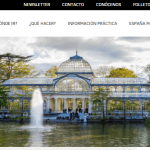SEGITTUR and TURIUM have presented the report “Reflexiones sobre turismo inteligente. El potencial del big data en la gestión de destinos” (Reflections on smart tourism. The potential of big data in destination management) for a 360º more practical view of data sources or providers and destinations.
The document consists of a set of articles and interviews that analyse the present and future of tourism intelligence, and look into the possibilities of improved management facilitated by data applied to the tourism sector.
The report was drafted with the collaboration of Javier Caballero, partner of McKinsey & Company and expert in Tourism; Ferrán García, director of data & analytics, CRM & marketing automation at Iberia; Inmaculada de Benito, Director of Tourism, Culture and Sport of the CEOE; and Samir Kayali, president of Urbim, developers of digital twins.
And Jean Francois Cases, President of EONA-X and Vice President, Associate General Counsel Intangibles, Data Value, Amadeus R&D; Rafael Fuente, Director of Tourist Intelligence for Costa del Sol; and Enrique Martínez, president of SEGITTUR.
The most interesting data for the tourism sector refers to macroeconomic trends, social networks, sentiment analysis, customer journeys and web browsing behaviour, according to the McKinsey partner: “The entire industry could improve satisfaction and profitability if data were shared more publicly in an actionable way”.
The president of SEGITTUR stresses that the Smart Destination Platform will contribute to a new generation of data for a new generation of destinations. The challenge is to train destinations to generate datasets linked to problem-solving or the management of public and private opportunities. Martínez insists that the important factor is the willingness to share data, the ability to generate it and to build models to solve problems.
Inmaculada de Benito states that “Big data allows us to have information in real time, which improves decision-making, and to analyse consumer trends, behaviour and emotions to stay ahead”.
For the Amadeus representative, working with large amounts of data requires technologies for storing and facilitating access for multiple agents, so that it can be efficient and utilised. Data spaces are becoming increasingly important, since they allow collaboration between different parties, which is so important in the tourism sector.
In the opinion of Ferrán García, director of Data & Analytics, CRM & Marketing Automation at Iberia, data analysis allows us to improve customer service, automate processes or improve the product, as it has happened to Iberia with its Centre for Data Excellence.
Lastly, the director of Tourist Intelligence for Costa del Sol has explained that its Big Data Tourist service (a portal where users can consult all tourism-related data generated in the destination) aims not to offer quantities of data, but that the data respond to the sector’s interests, since data is an instrument for knowledge.





